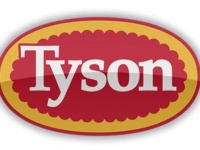Tyson Foods (TSN) Misses Q2 EPS by 27c, Offers Outlook

Get Alerts TSN Hot Sheet
Revenue Growth %: -0.1%
Financial Fact:
Less: Net Loss Attributable to Noncontrolling Interest: 1M
Today's EPS Names:
NLY, CP, RUSHA, More
Join SI Premium – FREE
Tyson Foods (NYSE: TSN) reported Q2 EPS of $0.77, $0.27 worse than the analyst estimate of $1.04. Revenue for the quarter came in at $10.89 billion versus the consensus estimate of $10.96 billion.
Outlook:
For fiscal 2020, USDA indicates domestic protein production (beef, pork, chicken and turkey) should increase approximately 3-4% from fiscal 2019 levels, but we expect export markets to absorb much of the increased production. The following is a summary of the outlook for each of our segments, as well as an outlook for capital expenditures, net interest expense, liquidity and tax rate for fiscal 2020. While our accounting cycle results in a 53-week year in fiscal 2020 as compared to a 52-week year in fiscal 2019, the fiscal 2020 outlook is based on a comparable 52-week year.
- COVID-19 – We continue to proactively manage the company and its operations through this global pandemic. Given the nature of our business, demand for food and protein may shift amongst sales channels and experience short-term disruptions, but over time we expect worldwide demand to continue to increase. We are experiencing multiple challenges related to the pandemic. These challenges are anticipated to increase our operating costs and negatively impact our volumes for the remainder of fiscal 2020. Operationally, we have and expect to continue to face slowdowns and temporary idling of production facilities from team member shortages or choices we make to ensure operational safety. The lower levels of productivity and higher costs of production we have experienced will likely continue in the short term until the effects of COVID-19 diminish. Each of our segments has also experienced a shift in demand from foodservice to retail; however, the volume increases in retail have not been sufficient to offset the losses in foodservice and as a result, we expect decreases in volumes in the second half of fiscal 2020. We cannot currently predict the ultimate impact that COVID-19 will have on our short- and long-term demand at this time, as it will depend on, among other things, the severity and duration of the COVID-19 crisis. Our liquidity is expected to be adequate to continue to run our operations and meet our obligations as they become due. Due to the uncertainty of the COVID-19 impacts to our operations, we are currently unable to provide segment adjusted operating margin guidance.
- Beef – We expect industry fed cattle supplies to increase approximately 2% in fiscal 2020 as compared to fiscal 2019. For the remainder of fiscal 2020, we expect ample supplies in regions where we operate our plants and for profitability to remain strong.
- Pork – We expect industry hog supplies to increase approximately 5% in fiscal 2020 as compared to fiscal 2019. For the remainder of fiscal 2020, we expect decreased livestock costs as compared to the same period in fiscal 2019 and export markets to become more available.
- Chicken – USDA projects a 3-4% increase in chicken production in fiscal 2020 as compared to fiscal 2019; however, more recent data indicates that chicken production for the remainder of fiscal 2020 will be lower than those projections. For the remainder of fiscal 2020, we do not believe pricing will improve, and we do not expect increased demand in consumer products to completely offset the expected decrease in foodservice.
- Prepared Foods – We anticipate some COVID-19-related disruptions in the availability of raw materials. Additionally, we expect overall raw material costs to decrease through the remainder of fiscal 2020 as compared to the same period in fiscal 2019. For the remainder of fiscal 2020, we believe increased retail sales will reduce the impact of lower foodservice demand.
- International/Other – International/Other primarily includes our foreign operations in Asia-Pacific, China-Korea and Europe, third-party merger and integration costs and corporate overhead related to Tyson New Ventures, LLC. We expect the improved results from our foreign operations in the first six months of fiscal 2020 to be challenged in the back half of fiscal 2020 due to market conditions associated with COVID-19.
- Capital Expenditures – For fiscal 2020, we expect capital expenditures to be approximately $1.2 billion. Capital expenditures will include spending for production growth, safety, animal well-being, infrastructure replacements and upgrades, and operational improvements that are expected to result in production and labor efficiencies, yield improvements and sales channel flexibility.
- Net Interest Expense – We expect net interest expense to approximate $470 million for fiscal 2020.
- Liquidity – We expect total liquidity, which was approximately $2.5 billion at March 28, 2020, to remain above our minimum liquidity target of $1.0 billion.
- Tax Rate – We currently expect our adjusted effective tax rate to be around 23% in fiscal 2020.
For earnings history and earnings-related data on Tyson Foods (TSN) click here.
Serious News for Serious Traders! Try StreetInsider.com Premium Free!
You May Also Be Interested In
- O'Reilly Automotive (ORLY) Misses Q1 EPS by 7c, Offers Guidance
- SLM (SLM) Tops Q1 EPS by 20c; offers guidance
- Alamos Gold (AGI) Misses Q1 EPS by 1c
Create E-mail Alert Related Categories
Earnings, GuidanceRelated Entities
Earnings, Definitive AgreementSign up for StreetInsider Free!
Receive full access to all new and archived articles, unlimited portfolio tracking, e-mail alerts, custom newswires and RSS feeds - and more!



 Tweet
Tweet Share
Share